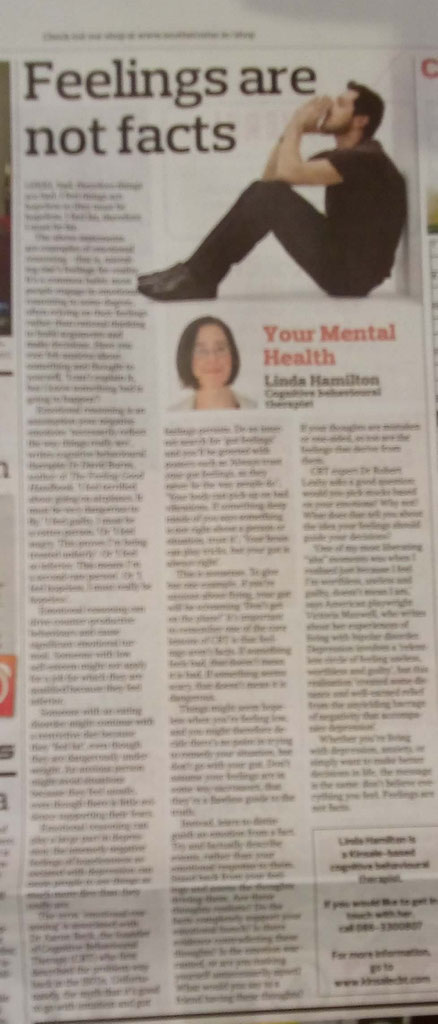
Emotional reasoning – mistaking your feelings for reality – can be bad for your mental health and well-being, as I explained in last week's Southern Star. The column is reproduced below.
I feel bad, therefore things are bad. I feel things are hopeless so they must be hopeless. I feel fat, therefore I must be fat.
The above statements are examples of emotional reasoning – that is, mistaking one’s feelings for reality. It’s a common habit: most people engage in emotional reasoning to some degree, often relying on their feelings rather than rational thinking to build arguments and make decisions. Have you ever felt anxious about something and thought to yourself, “I can’t explain it, but I know something bad is going to happen”?
Emotional reasoning is an assumption your negative emotions ‘necessarily reflect the way things really are’, writes cognitive behavioural therapist Dr David Burns, author of The Feeling Good Handbook. ‘“I feel terrified about going on airplanes. It must be very dangerous to fly.” “I feel guilty. I must be a rotten person.” Or “I feel angry. This proves I’m being treated unfairly”. Or “I feel so inferior. This means I’m a second-rate person”. Or “I feel hopeless. I must really be hopeless”’.
Emotional reasoning can drive counter-productive behaviours and cause significant emotional turmoil. Someone with low self-esteem might not apply for a job for which they are qualified because they feel inferior. Someone with an eating disorder might continue with a restrictive diet because they “feel fat”, even though they are dangerously underweight. An anxious person might avoid situations because they feel unsafe, even though there is little evidence supporting their fears. Emotional reasoning can play a large part in depression; the intensely negative feelings of hopelessness associated with depression can cause people to see things as much more dire than they really are.
The term “emotional reasoning” is associated with Dr Aaron Beck, the founder of CBT who first described the problem way back in the 1970s. Unfortunately, the myth that it’s good to go with intuition and gut feelings persists. Do an internet search for “gut feelings” and you’ll be greeted with posters such as “Always trust your gut feelings, as they never lie the way people do”; “Your body can pick up on bad vibrations. If something deep inside of you says something is not right about a person or situation, trust it”; “Your brain can play tricks, but your gut is always right”.
This is nonsense (continued below...)
IGNORE YOUR GUT
To give but one example, if you’re anxious about flying, your gut will be screaming “Don’t get on the plane!” It’s important to remember one of the core lessons of CBT is that feelings aren’t facts. If something feels bad, that doesn’t mean it is bad. If something seems scary, that doesn’t mean it is dangerous. Things might seem hopeless when you’re feeling low, and you might therefore decide there’s no point in trying to remedy your situation, but don’t go with your gut. Don’t assume your feelings are in some way sacrosanct, that they’re a flawless guide to the truth.
Instead, learn to distinguish an emotion from a fact. Try and factually describe events, rather than your emotional response to them. Stand back from your feelings and assess the thoughts driving them. Are these thoughts realistic? Do the facts completely support your emotional hunch? Is there evidence contradicting these thoughts? Is the emotion warranted, or are you making yourself unnecessarily upset? What would you say to a friend having these thoughts? If your thoughts are mistaken or one-sided, so too are the feelings that derive from them.
CBT expert Dr Robert Leahy asks a good question: would you pick stocks based on your emotions? Why not? What does that tell you about the idea your feelings should guide your decisions?
LIBERATING
‘One of my most liberating “aha” moments was when I realised just because I feel I’m worthless, useless and guilty, doesn’t mean I am”, says American playwright Victoria Maxwell, who writes about her experiences of living with bipolar disorder. Depression involves a “relentless circle of feeling useless, worthless and guilty”, but this realisation “created some distance and well-earned relief from the unyielding barrage of negativity that accompanies depression”.
Whether you’re living with depression, anxiety, or simply want to make better decisions in life, the message is the same: don’t believe everything you feel. Feelings are not facts.